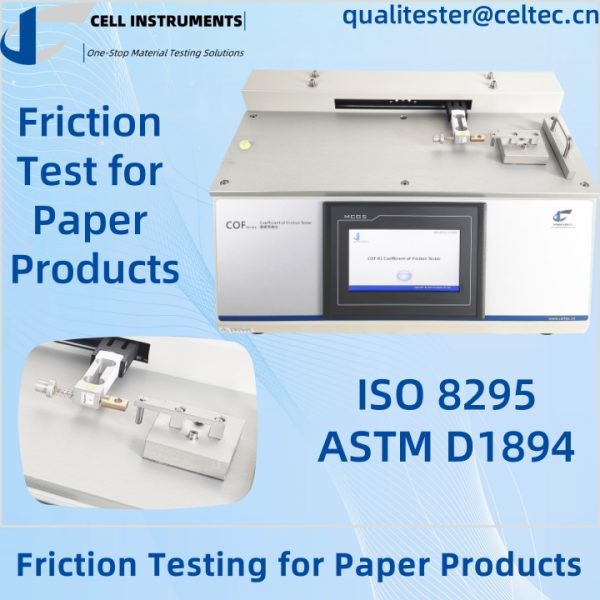Friction Testing for Paper Products with ASTM D1894 and ISO 8295
Introduction to Friction Testing for Paper Products
Friction testing for paper products is essential for ensuring the quality, performance, and usability of various materials used across multiple industries. By measuring the resistance encountered when paper surfaces slide against each other, manufacturers can optimize their products for better handling, printing, and converting processes. This article explores the significance of friction testing, key standards like ASTM D1894 and ISO 8295, and the advanced testing equipment offered by Cell Instruments.
Understanding the Basics of Friction Testing
The Importance of Friction Testing for Paper Products
Friction testing provides valuable insights into the behavior of paper materials under different conditions. It helps in determining the coefficient of friction (CoF), which is critical for various applications such as packaging, printing, and converting. Accurate CoF measurements ensure that paper products meet industry standards and perform reliably in their intended applications.
Key Standards for Friction Testing: ASTM D1894 and ISO 8295
Two widely recognized standards for friction testing of paper products are ASTM D1894 and ISO 8295. These standards provide detailed methodologies for measuring the static and kinetic CoF of materials, ensuring consistency and comparability of results across different laboratories and industries.
ASTM D1894 Standard for Friction Testing
ASTM D1894 is a standard test method for determining the CoF of plastic film and sheeting, which is also applicable to paper products. The test involves placing a paper sample on a horizontal plane and pulling a sled with a specified weight across it at a constant speed. The forces required to initiate and maintain movement are recorded to calculate the static and kinetic CoF.
ISO 8295 Standard for Friction Testing
ISO 8295 is an international standard that outlines the procedure for measuring the CoF of plastic films and sheeting, similar to ASTM D1894. The test setup includes placing the sample on a flat surface and pulling a sled across it at a constant speed. The standard specifies the sled weight and test speed to ensure uniform testing conditions.
Advanced Friction Testing Equipment by Cell Instruments
At Cell Instruments, we offer state-of-the-art friction testing equipment designed to meet the diverse needs of our clients. Our equipment is engineered for precision, reliability, and versatility, ensuring accurate and consistent CoF measurements for paper products.
Features of Cell Instruments’ Friction Testing Machines
- High Precision: Advanced sensors and calibration systems guarantee accurate CoF measurements with minimal variability.
- User-Friendly Interface: Easy-to-use controls and intuitive software make the operation simple for all users.
- Customization Options: Tailored solutions to meet specific testing requirements and integrate seamlessly into existing processes.
- Robust Design: Durable construction ensures long-term reliability and minimal maintenance.
Applications and Industry Use Cases
Packaging Industry
In the packaging industry, friction testing ensures that paper materials do not stick together excessively or slide apart too easily, affecting the integrity and usability of packaging products.
Printing and Converting
For printing and converting processes, controlling the CoF is crucial for smooth operations and high-quality outputs. Friction testing helps in optimizing the handling and performance of paper products.
Quality Control and Compliance
Accurate friction testing is vital for quality control and compliance with industry standards. By adhering to ASTM D1894 and ISO 8295, manufacturers can ensure their paper products meet regulatory requirements and customer expectations.
Conclusion
Friction testing for paper products is a critical aspect of quality control and performance optimization. By adhering to standards like ASTM D1894 and ISO 8295, and utilizing advanced testing equipment from Cell Instruments, manufacturers can ensure their products meet the highest quality standards and perform reliably in various applications.
FAQs
What is friction testing for paper products?
Friction testing measures the resistance encountered when paper surfaces slide against each other, providing insights into the material’s behavior under different conditions.
Why is friction testing important for the packaging industry?
It ensures that paper materials used in packaging do not stick together excessively or slide apart too easily, maintaining the integrity and usability of the packaging.
What are ASTM D1894 and ISO 8295 standards?
These are widely recognized standards that provide methodologies for measuring the static and kinetic coefficients of friction for paper products.
How does Cell Instruments’ friction testing equipment ensure accuracy?
Our equipment features advanced sensors, calibration systems, and robust design to guarantee precise and consistent CoF measurements.
Can Cell Instruments’ friction testing machines be customized?
Yes, we offer tailored solutions to meet specific testing requirements and seamlessly integrate into existing processes.
Related Products
Coefficient of Friction Testing Equipment
Related Article
Dynamic Friction Testing Machine
Film Friction Coefficient Tester
Coefficient of Friction of Plastic Films
Coefficient of Friction of Paper
Friction Test Method for Packaging Films
Friction Test Equipment for Paper Products
Friction Coefficient Tester for Paper

